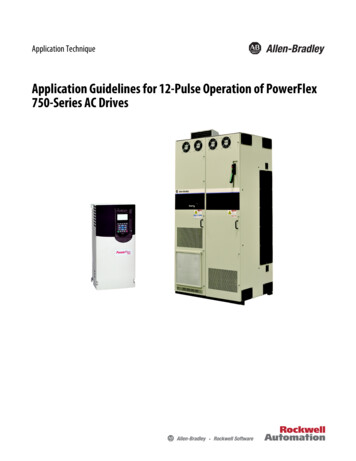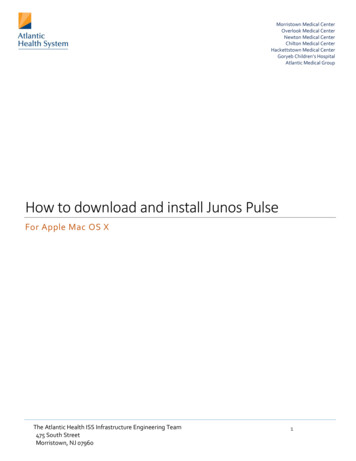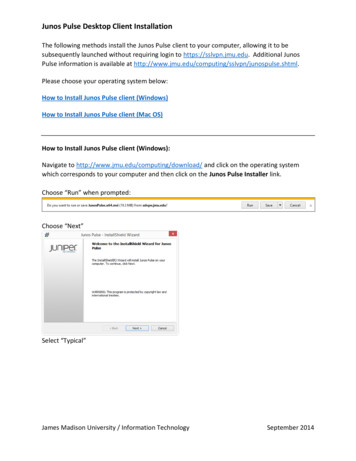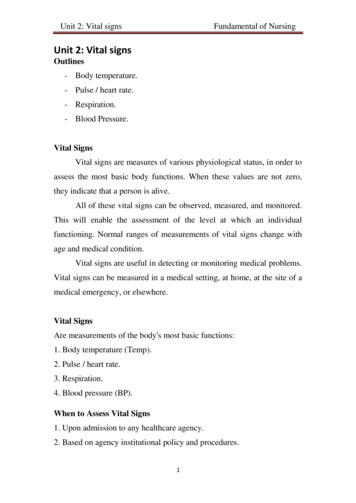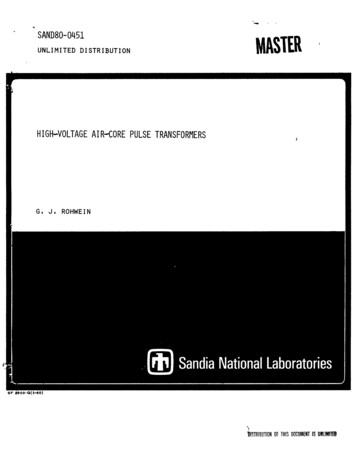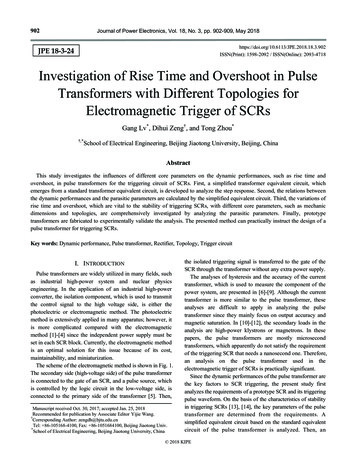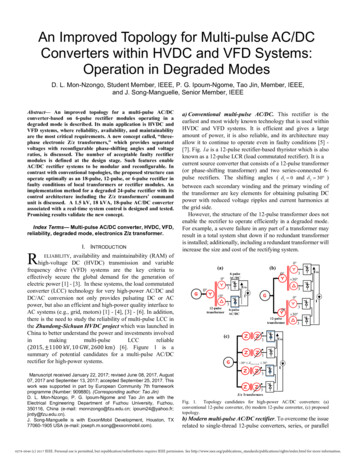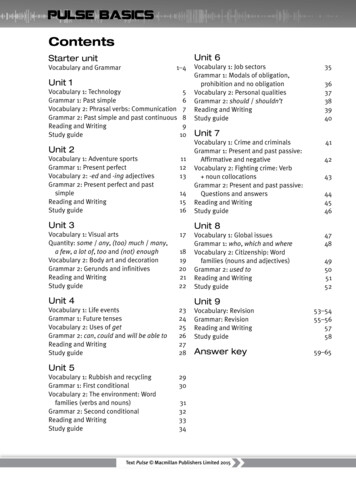
Transcription
pulse basicsContentsUnit 6Starter unitVocabulary and Grammar1–4Unit 1Vocabulary 1: TechnologyGrammar 1: Past simpleVocabulary 2: Phrasal verbs: CommunicationGrammar 2: Past simple and past continuousReading and WritingStudy guide5678910Unit 2Vocabulary 1: Adventure sportsGrammar 1: Present perfectVocabulary 2: -ed and -ing adjectivesGrammar 2: Present perfect and pastsimpleReading and WritingStudy guide111213141516Unit 3Vocabulary 1: Visual artsQuantity: some / any, (too) much / many,a few, a lot of, too and (not) enoughVocabulary 2: Body art and decorationGrammar 2: Gerunds and infinitivesReading and WritingStudy guide171819202122Unit 4Vocabulary 1: Life eventsGrammar 1: Future tensesVocabulary 2: Uses of getGrammar 2: can, could and will be able toReading and WritingStudy guide232425262728Vocabulary 1: Job sectorsGrammar 1: Modals of obligation,prohibition and no obligationVocabulary 2: Personal qualitiesGrammar 2: should / shouldn’tReading and WritingStudy guide3637383940Unit 7Vocabulary 1: Crime and criminalsGrammar 1: Present and past passive:Affirmative and negativeVocabulary 2: Fighting crime: Verb noun collocationsGrammar 2: Present and past passive:Questions and answersReading and WritingStudy guide414243444546Unit 8Vocabulary 1: Global issuesGrammar 1: who, which and whereVocabulary 2: Citizenship: Wordfamilies (nouns and adjectives)Grammar 2: used toReading and WritingStudy guide474849505152Unit 9Vocabulary: RevisionGrammar: RevisionReading and WritingStudy guide53–5455–565758Answer key59–65Unit 5Vocabulary 1: Rubbish and recyclingGrammar 1: First conditionalVocabulary 2: The environment: Wordfamilies (verbs and nouns)Grammar 2: Second conditionalReading and WritingStudy guide35293031323334Text Pulse Macmillan Publishers Limited 2015
pulse basicsSTARTERVocabularyCommunication verbs1 Complete the labels for the pictures with the words in the box.bow chat kiss phone shake hands smileissk3 sh1 b2 s4 c5 p2 Find seven communication verbs in the waveing3 Read the definitions and order the letters tomake words.move your head to say ‘yes’nodOND4 Circle the correct verbs.Sit down, please. I’m going to say / tell you a story.1 Joe, you tell / speak Spanish. Can you help mewith my homework?2 I don’t understand. What are you talking /saying about?3 I’m sorry. I don’t know how to speak / say thatin English.4 Can you say / tell me a funny joke?1 send an SMSXETT2 move your head to say ‘no’EAKSH your head3 what you do when you are happyMISEL1Photocopy me!Text Pulse Macmillan Publishers Limited 2015
pulse basicsGrammarPresent simpleSTARTERPresent egativequestionsI / You speakI / You don’tspeakDo I / youspeak?I’m talkingI’m not talkingAm I talking?You’re talkingHe / She / itspeaksHe / She /itdoesn’t speakDoes he / she/it speak?You aren’ttalkingAre youtalking?He / She / It ‘stalkingHe / She / Itisn’t talkingIs he / she /ittalking?We / You / They We / You / They Do we / you /speakdon’t speakthey speak?1 Match sentence beginnings 1–4 with endingsa–d.1234My sister studiesWe don’tOur teacherIWe / You /We / You / They Are we / you /They’re talking aren’t talkingthey talking?3 Circle the correct words.a) has got long, fair hair.b) maths at university.c) don’t drive a car.d) go to school on Sundays.adverbs of always2 Complete the sentences with the correct adverbof frequency.I usuallyMrs Mooregives usJackSue4 Order the words to make questions.is / What / doing / he ?What is he doing?eat at restaurants.2 My maths teacher aTom FloydLucy is / isn’t laughing.1 Floyd is / isn’t eating something.2 Jack is / isn’t phoning a friend.3 Sue is / isn’t wearing a dress.get up early at weekends.1 My family don’t oLucy1 you / Where / are / going ?homework.3 She neats pasta.4 We s2 talking / they / Are / in / class ?listen to music.3 wearing / Is / a / she / dress ?LOOK!We always go to the supermarket at theweekend.ButWe are always at home on a Saturday night.5 Complete the sentences with the presentcontinuous form of the verbs in brackets.I ’m chatting1 Heonline with Tom now. (chat)trainers today. (not wear)2 They3hands in the photo. (shake)youto musicin your bedroom at the moment? (listen)4 ShePhotocopy me!Text Pulse Macmillan Publishers Limited 2015at home today. (work)2
pulse basicsSTARTERVocabularyAdjectivesadjectivesynonym3 Match adjectives 1–6 with synonyms ld / coolbiglargesmall / twetfastbigsmallhota) rainyb) warmc) larged) littlee) rapidf ) hard4 Circle the correct antonyms so the sentences aretrue for you.1 Find eight adjectives in the OPAJHOI12345Learning Japanese is easy / hard.My computer is new / old.Spain is a very cold / hot country.My teacher is short / tall.The Spanish football team is really bad / good.2 Order the letters to make adjectives.satffast1 dogo2 ryd5 Choose the best adjective from the box todescribe 1–5.3 toh4 gibbig fast hard hot smallAn insect:small1 Usain Bolt:2 Russia:3 A fire:4 Learning Chinese:3Photocopy me!Text Pulse Macmillan Publishers Limited 2015
pulse basicsSTARTERGrammarComparatives and superlatives3 Complete the sentences with the words andphrases in the box.LOOK!We use comparatives to compare twothings.We use superlatives to compare three ormore things.better bigger more interesting the furthestthe heaviest the most dangerousThe crocodile isthe most dangerousriveranimal in the world.1 Circle the correct words.1 I think Roman history isthan modern history.2 Vegetables arefor youthan chocolate.3 Australia iscountryfrom Spain, it’s on the other side of the world!4 The cathedral in Seville is a bitthan the Sagrada1234The giraffe is taller than / the tallest animal inthe world.Arabic is the most difficult / more difficultthan Spanish.Mount Everest is the highest / higher thanmountain in the world.Diamonds are more expensive than / the mostexpensive silver.Rihanna is better than / the best singer in theUSA.Familia in Barcelona.5weighs 465 kilos!4 Circle the correct words.12LOOK!3Irregular adjectivesgoodbetter (than)badworse (than)farfurther (than)man in the worldthe bestthe worstthe furthest4Mount Everest is the highest / highestmountain in the world.Arabic is the most difficult / more difficultlanguage.The giraffe is taller / the tallest animal in theworld.Diamonds are more expensive / the mostexpensive jewels you can buy.I think Adele is best / the best singer in the UKat the moment.2 Complete the table.adjectivecomparativesuperlativefatfatterthe fattesteasy(1)the easiestlong adjectivesdifficultmore difficult(2)irregular adjectivesgoodbetter(3)bad(4)the worstfarfurther(5)short adjectivesPhotocopy me!Text Pulse Macmillan Publishers Limited 20154
pulse basicsVocabulary 1Technology1 Find and circle six technology words in thewordsnake.laptoletappsocialnetwngorkisitewitein s t a n t mescloud computing earphoneslandline laptop readersangabsebgipt3 Complete the sentences with the words inthe box.I store all my information on the internet – Ithink cloud computing is great!2 Label the pictures with the words in the box.charger gadget games consoletext message website1 Can I use your eto listen tomusic? I can’t hear anything with mine!2 She hasn’t got a lat home, sheuses her mobile phone to make phone calls.3 I need a new lbut computersare so expensive!4 I got an e-for Christmas. I’mreading Harry Potter at the moment.text message14 Circle the correct words.1234I use my e-reader / laptop to do myhomework.She always sends text messages from herlandline / mobile phone.Can I use your charger / earphones, please?My battery’s dead.Cloud computing / A social networking site isused to store information online.I can’t download apps / earphones on mymobile phone because it’s very old.25 What types of technology do you use .1 at home?2 at school?345Photocopy me!3 when you are out with friends?Text Pulse Macmillan Publishers Limited 2015
pulse basicsGrammar 1Past simple3 Match questions 1–5 with answers a–e.be: past simpleaffirmative negativequestionI wasI wasn’tWas I?You wereYou weren’tWere you?He / She / ItwasHe / She / Itwasn’tWas he / she/ it?We / You / They You / We / They Were you / we /wereweren’tthey?1 Complete the sentences with was or were. Usethe affirmative, negative or question forms.Wewereat home yesterday. 41 Theyhappy when they didn’t passthe exam. 82 Wheremy birthday yesterday. 44 Whereyou at the weekend?5 Heat school yesterday. 8past simpleaffirmative negativequestionI / You talkedI / You didn’ttalkDid I talk?He / She / Itdidn’t talkDid he / she / ittalk?He / She / IttalkedWe / You / They We / You / They Did we / you /talkeddidn’t talkthey talk?2 Complete the sentences with the verbs inbrackets in the past simple.arrivedMy new computerlast week.(arrive)1 My brothercomputer gameslast night. (play)2 The games consolebecause itdidn’t have any batteries! (not work)3 Theythe new Daniel Radcliffefilm last night. (see)a) Yes, I did. It was maths exercises.b) No, I didn’t. I didn’t have my computer at home.c) Yes, I did. It was very easy to use and I read onthe bus.d) Yes, I did. I watched the film and it was great!e) No, I didn’t. We used a pen!Past continuoushe last night?3 Ita1 Did you do your homework last night?2 Did you have a computer when you wereyoung?3 Did you read that book on an e-reader?4 Did you write on your blog at the weekend?5 Did you download that video?past continuousaffirmative negativeI was playingI wasn’t playing Was I playing?You wereplayingYou weren’tplayingWere youplaying?He / She / Itwas playingHe / She / Itwasn’t playingWas he / she /it playing?We / You / They We / You / They Were we / youwere playingweren’t playing / they playing?4 Write short answers to the questions with wasor were.I wasWere you watching TV? Yes,.1 Were they chatting online? No,.2 Were we talking to each other? Yes,.3 Was Tom working on the computer?No,.5 Complete the sentences with the verbs inbrackets in the past continuous.Iwas working2 Who(work) on Saturday afternoon.you(chat) to onlinethis morning?3 They4 Sheyesterday, shePhotocopy me!questionText Pulse Macmillan Publishers Limited 2015(run) in the park on Sunday.(not listen) to music(study).6
pulse basicsVocabulary 2Phrasal verbs: Communication1 Circle the correct prepositions.5 Match situations 1–4 with pictures a–d.Turn the music up / out. I can’t hear it!1 I can’t talk to you now. Can you call mewith / back?2 The police have found on / out the name ofthe murderer.3 My dad set off / up his company in 2014.1234I’ll call you back when I get home.I use a dictionary to look up new words.Will you turn it down now please?We’ve got so much to catch up on!(a)2 Order the letters to make phrasal verbs.RTUFFNOturn off1 RPNTUU2 FIOUTND3 LOROKFO4 ALLCCKBA(b)5 LOKUPO3 Match phrasal verbs 1–6 with definitions a–f.123456look upturn upfind outcall backcatch upturn downa) discoverb) search for informationc) make the volume quieterd) talk to someone aboutrecent events in their lifee) telephone someone againf ) make the volume louder(c)4 Circle the correct phrasal verbs.12347I can’t talk now. I’ll call you back / turn youdown this evening.My dad is looking for / looking up a new job.She wants to catch up / set up a new businessin computer programming.I can’t find my pen. Can you help melook it up / look for it, please?For homework we have to set up / find outsome information about Picasso.Photocopy me!(d)Text Pulse Macmillan Publishers Limited 2015c
pulse basicsGrammar 2Past simple and past continuous3 Circle the two correct verbs in each sentence.LOOK!We use when with the past simple.We use while with the past continuous.11 Circle the correct words.1234While / When he was waiting for the bus, hesaw an accident.We were running in the park when / while wesaw a big dog.While / When we were talking, our friendbought the cinema tickets.Were you having a shower when / while Iphoned you?I was cycling to school when / while I fell offmy bike.2 Order the words to make sentences.getting / I / I into / I saw / a bear / my tent /was / While .While I was getting into my tent, I sawa bear.1 home / It / snowed / while / we / were /walking .Ithome.2 we saw / the dolphin / swimming / the sea / in/ We / were / when .We werethe234She was chatting / chatted online when herbrother was arriving / arrived home.While she was finishing / finished dinner, shewas doing / did her homework.It was raining / rained when we arrived / werearriving at the party.I lost / was losing my computer while Istudied / was studying at school.While I was running / ran for the bus, I fell /was falling over!communicate4 Circle the correct verbs to complete thedialogue.Rick: Hi Sam. Are you OK?Sam: No, I (1) had / was having a difficult dayyesterday.Rick: Why? What happened to you?Sam: First, I (2) was losing / lost my keys whileI (3) walked / was walking to school.Rick: Then what (4) was happening /happened?Sam: I (5) was meeting / met Jake and we(6) started / was starting chatting andI was very late for class. My teacher wasvery angry!dolphin.3 she / laughing / when / Jill / said / was /‘hello’ .Jill‘hello’.4 the / eating / phone / I / when / my /breakfast / rang / was .I wasphonerang.Photocopy me!Text Pulse Macmillan Publishers Limited 20158
pulse basicsReadingWriting1 Read the review, then answer the questions.3 Read Henry’s notes about laptop computers.1 Did Amy buy a mobile phone?AdvantagesIt’s quite cheap.It’s easy to use.2 Does Amy like it?DisadvantagesIt’s slow.It’s big and heavy.Last month I got thenew Zphone 8 and Ilove it. It looks greatand it’s easy to use.Here are some of thepros and cons:ConclusionI love my laptop!It’s light and it hasa large screen so it can display moreinformation. The big screen makes itvery easy to see what I’m reading. Thisis good when I look up things on theinternet. Also, it’s a bit bigger than theZphone 7 and I can look at photos easily.The camera is excellent too. It worksreally well.4 Now complete Henry’s review.Laptop computers – Are they betterthan tablet computers?I’ve got a laptop computer, and I loveit! It’s great and I don’t want a tabletcomputer. Here are some advantagesand disadvantages of the laptopcomputer:The main disadvantage is the battery life.It doesn’t last very long if you want toplay games or film videos.The laptop computer is quite(1) cheap . I think it’s (2)use when I do my homework.In conclusion, I think that the Zphone 8is great. It’s quite expensive, but I wouldrecommend it!The main disadvantage of the laptopcomputer is that it’s very (3)and I can’t watch videos on it. It’s too, in my opinion.(4)2 Read the review in exercise 1 again and circle (T)true or (F) false.The mobile phone is big and heavy.1 The mobile phone is good for reading.2 Amy likes taking photos on her mobilephone.3 The mobile phone is very cheap.9Photocopy me!toT FT FIn conclusion, I prefer my (5)because it’s cheap and easy to use athome and at school.T FT FText Pulse Macmillan Publishers Limited 2015
pulse basicsStudy guideGrammar for verbs that end in consonant -y, omit the -yand add -ied: carry carriedPast simple we use the past simple to talk about events inthe past in affirmative sentences, we form the pastsimple with subject past formWe played computer games yesterday. in negative sentences, we use subject did not(didn’t) infinitiveHe didn’t write a blog. for verbs that end in consonant vowel consonant, double the final consonant andadd -ed: stop stopped we form superlatives by adding -est to adjectiveswith only one syllable and adjectives with twosyllables ending in -y: fast the fastest for other adjectives with more than one syllable,we use most adjective: interesting the mostinteresting in questions, we use Did subject infinitiveVocabularyDid you cycle to school?TechnologyPast continuousapps we use the past continuous to describe actionsthat were in progress in the pastcharger we form the past continuous with was / were verb -ingcloud computinge-readerearphonesgames consoleinstant messaginglandlinelaptopmobile phonesocial networking siteI was talking to David. we use wasn’t or weren’t to form the negativeThey weren’t watching the film.Past simple and pastcontinuous we use the past continuous for actions inprogress in the past and the past simple forevents which interrupt the action in progress we use the past simple after whenI was eating when John arrived. we use the past continuous after whileWhile I was watching a DVD, my friend called.Spelling rules: past simple,comparatives and superlatives for most verbs, add -ed in the past simple:talk talked for verbs that end in -e, add -d: arrive arrivedPhotocopy me!Phrasal verbs:Communicationcall backlog onset upcatch uplook forturn offfind outlook upturn upText Pulse Macmillan Publishers Limited 201510
pulse basicsVocabulary 1Adventure sports1 Label the pictures with the words in the box.kayaking motocross rock climbingskating skydiving snowboarding3 Read the clues and complete the definitions.You use two skis and move on water.waterskiing1 You climb steep mountain sides using specialequipment and techniques.r2 You jump out of a plane and then freefallbefore you use your parachute.s3 You use a type of canoe to go down river.skydiving1 rk4 You use a special floating platform to go downa river.r4 Circle the correct adventure sport.You need a kite and a boat.kite surfing / bungee jumping1 You drive a special motorbike.2 s3 srock climbing / motocross2 You jump from a bridge with a rope.bungee jumping / base jumping3 You need a mountain and snow.snowboarding / BMX4 m5 k5 Answer the questions. Write sentences that aretrue for you.1 Do you like adventure sports? Why / Why not?2 Complete the words with vowels.k a y a k i ngare brave or mad?1 r ft ng2 b sj mp ng3 skyd v ng4 w t rsk112 Do you think people who do adventure sports3 What is the most dangerous sport you’ve tried?ngPhotocopy me!Text Pulse Macmillan Publishers Limited 2015
pulse basicsGrammar 1Present perfect with timeexpressionsPresent perfectaffirmativenegativequestionI / You havetriedI / You haven’ttriedHave I / youtried?He / She / Ithas triedHe / She / Ithasn’t triedHas he / she / ittried?We / You / They We / You / They Have we / youhave triedhaven’t tried/ they tried?1 Complete the table with the correct form of theirregular verbs.infinitiveLOOK!for and sinceWe use for to talk about a period of timewhich started in the past and continues now.I have studied English for two years.(I study English now.)We use since to talk about a point / datein time which started in the past andcontinues now.I have lived in Madrid since 2014.(I live in Madrid now.)past participlebepast simple(1) en1 He has studied mathsflyflew(6)2 They have loved skiingforgetforgot(7)3 I have done karategive(8)given4 He has competed in BMX competitionswear(9)wornwritewrote(10)been4 Complete the sentences with for or since.She has lived in New Yorksince2013.five years!last winter.I was six.a long time.5 Circle the correct words.2 Order the words to make sentences.I / done / homework / have / all / my .I have done all my homework.1 brother / bungee / not / tried / My / has /jumping .Fernando Alonso has (1) already / yetwon the World Championships twice.He has (2) already / just been a FormulaOne driver for years, and he drives forFerrari. He hasn’t won a race with Ferrari(3) yet / already, but we hope he will!2 her / leg / She / broken / has .3 studied / have / since / English / 2011 / They .3 Write the contracted form of the verbs inexercise 2.I’ve doneI have done1 My brother has not tried2 She has broken3 They have studiedPhotocopy me!Text Pulse Macmillan Publishers Limited 201512
pulse basicsVocabulary 2-ed and -ing adjectives3 Complete the sentences with the correctadjective from the box.LOOK!-ed and -ing adjectivesWe use -ed adjectives to say how we feel.We use -ing adjectives to describe thesituation that causes our feeling.The journey was tiring. I was tired at the endof the day.boring exciting relaxing surprising tiringSkydiving is reallyexciting1 I hate running, it’s so.2 I passed the exam, that’s very3 At the beach it’s1 Order the letters to make adjectives.tiringintgri.4 I hate physics, it’s so.4 Complete the sentences with the correct form ofthe words in brackets.1 itecdex2 rprsiseudAdventure sports are very3 hfreiigndte(excite)4 wordrieexciting.1 I’ve got a maths test today and I’m5 lrenaxig. (worry)6 barmresedas2 We’ve seen this film before, it’s totally7 reodb. (bore)3 Studying all day is2 Circle the correct words.How do you feel in these situations?My grandmother won a skateboardingcompetition!surprised / surprising1 You win five million euros in the lottery.excited / exciting2 You have an argument with your friend.worrying / worried3 You fall asleep in maths class.bored / boring4 My mum sings in the shower!embarrassing / embarrassed13.Photocopy me!4 I was very. (tire)when I had to singat school. (embarrass)5 Answer the questions so they are true for you.How do you feel in these situations?1 You are late for school. I feel.2 You have an argument with your parents. I feel.3 You watch a horror film. I feelText Pulse Macmillan Publishers Limited 2015.
pulse basicsGrammar 2Present perfect and past simple1 Match examples 1 and 2 with rules a) and b).5 Order the words to make questions.present perfect and past simple1 The man called the police yesterday.2 I have been to Italy.a) We use the present perfect for actions thathappened in the recent past.b) We use the past simple for actions thathappened at a specific time.2 Circle the correct verb form.Mary has lost / lost her gloves.1 You had / have had long hair the last timewe met.2 She bought / has bought some shoes at theweekend.3 Luisa broke / has broken her leg. She can’twalk!4 I’ve never been / never went to Australia.3 Match the sentence beginnings and endings.12345I’ve neverThey didn’tWe didHas sheAlison hasn’ta) passed all her exams.b) finish their homeworkyesterday.c) been to Italy?d) met a famous person.e) an exam last week.Have / bungee jumping / ever / tried / you ?Have you ever tried bungee jumping?1 your pen / How / have / long / you / had ?2 family / lived / Has / your / for / here / a /long / time ?3 What / have / yesterday / you / did / for /breakfast ?4 Circle the correct answers.aa sports competition?a) Have you ever won1 Theyb) likedall your exams last year?a) Did you pass3 Whatb) Have you passedfor dinner yesterday?a) has he had4 I4 did / When / this / start / class ?each other since last summer.a) have liked2b) Did you ever winb) did he havemy best friend for three years.a) have knownPhotocopy me!b) knew6 Write your answers to the questions fromexercise 5.12345Text Pulse Macmillan Publishers Limited 201514
pulse basicsReading1 Read Nina’s blog and answer the questions.1 Is Nina enjoying her holiday?2 What cities have they visited?Nina’s blog!We’ve arrived!Posted on 1st September 21.30Well, we’ve arrived in Jerez! My dadwon four tickets for a helicopter ride oversouthern Spain! Our flight was on timeand we’ve just checked into our hotel butwe haven’t had dinner yet.An exciting day in the helicopterPosted on 2nd September 21.00This morning we went on our helicopterride. We saw the Costa de la Luz. Itwas really interesting. I’ve taken lotsof photos for you all! My little sisteris excited as we’re going to see someflamenco dancing this evening.2 Read Nina’s blog in exercise 1 again and circlethe correct answers.1 When did Nina arrive in Jerez?a) 1st Septemberb) 2nd Septemberc) 3rd September2 What did they see on their helicopter ride?a) Seville b) Jerez c) Costa de la Luz3 Has Nina taken any photos yet?a) I don’t know. b) Yes, she has.c) No, she hasn’t.4 Where hasn’t Nina been yet?a) on a tour b) to the beachc) in a helicopterWriting3 Look at Andrew’s notes about his journey to Paris.Sat urda y 9th : plan e was late !min g poo lHotel is inte rest ing, it has a big swimvisited Eif fel Towerur – exc itingSun day 10th : wen t on a trip to Sac ré CoecityMo nda y 11th : wen t on a bus aro und theVisi ted Dis ney land4 Now use the notes to complete Andrew’s blog.Some sightseeing Posted on 3rd September 18.30We’ve alreadyseen so much here.Today we wenton a tour of Sevilleand it was amazing.I haven’t been tothe beach yet.I hope you’re allwell in England.See you soon!I love France!Saturday 9thIt took a long time to arrive in Paris today because(1) the plane was late . The hotel is very(2)and it has a (3)We’ve just visited the (4).A good day in ParisSunday 10thToday has been so (5)because we wenton a trip to the Sacré Coeur. I’ve taken lots of photos.Some sightseeingMonday 11thParis is a fantastic city. We’ve just been on a(6)around the city. The best thingis we (7)and I saw Mickey Mouse.My little brother loved it.15Photocopy me!.Text Pulse Macmillan Publishers Limited 2015
pulse basicsStudy guideGrammarPresent perfectPresent perfect and past simple we use the present perfect to talk aboutexperiences or actions in the past when we don’tmention (or we don’t know) the exact time we use the past simple for actions thathappened at a specified time; we use thepresent perfect for actions that happened at anunspecified timeHe has been to Las Vegas. we use the present perfect for actions thatstarted in the past but are still true now, orhaven’t finishedI have lived here for three years. we form the present perfect affirmative withhave / has the past participle of the verbShe has visited the Eiffel Tower. we form the negative with haven’t / hasn’t thepast participle of the verbWe haven’t been to the skate park. we form questions with have / has subject past participleWhat have you done?Alex competed in the X Games last year.He has competed in other events, too. we also use the present perfect for things thathave happened once or a number of times in acertain time periodI’ve been to the gym twice this week. we use the present perfect to ask questionsabout experiences in the pastHave you ever been kayaking?VocabularyAdventure sportsbase jumpingBMXbungee jumpinginline skatingkayakingmotocrossraftingrock climbing we use yet for actions that we expect to happenbut that haven’t happened so farskydivingsurfing we use already to say that something hashappened sooner than we expectedwaterskiingPresent perfect with timeexpressions we use for with duration of time we use since with starting points in time (whenthe activity commenced) we use just to talk about actions that havehappened very recently we often use ever with the present perfect to askquestions about experiences in the past we use never with the present perfect to talkabout experiences we haven’t hadPhotocopy me!-ed / -ing adjectivesbored / boringembarrassed / embarrassingexcited / excitingfrightened / frighteningrelaxed / relaxingsurprised / surprisingtired / tiringworried / worryingText Pulse Macmillan Publishers Limited 201516
pulse basicsVocabulary 1Visual arts3 Complete the sentences with the words inthe box.1 Find and circle ten visual arts words in thewordsnake.l p t u rescscuitiinstallationlandintg ra f fo t o g ra p h p o r t rpringpha pestilllife234122 Read the definitions and circle the correctanswers.1drawing pottery print sculpture still lifea i t p ot t eawrydrA picture of a person.a) portraitb) landscapeA picture of trees and mountains.a) still lifeb) landscapeA colourful picture or writing on a wall.a) graffitib) drawingA model of a person or an object.a) still lifeb) sculptureAn image from a camera.a) drawingb) photograph34which is a beautiful copyI bought a printof an original picture.paintings usually include fruit orSobjects, no people or faces.of our bestToday at school we did a dfriend in pencil.class, we made potsWith clay in pand bowls.at the museum ofI saw a fantastic sa woman and child made out of stone.4 Circle the correct words.1234I really like that portrait / landscape becauseher face looks so real.There’s a sculpture / drawing of a man sittingon a bench in that park. You can go and sitnext to him!I went to pottery / graffiti classes but I onlymade a very strange bowl.Someone has painted graffiti / drawing on thedoor of our school.She bought a sculpture / print of Van Gogh’slast painting.5 Match the words from the box with definitions 1–6.graffiti landscape photograph portraitpottery printart on walls or public placesgraffiti1 a picture taken with a camera2 clay objects3 a painting of a region or piece of land4 a picture of someone’s face5 a copy of original art, usually made on paper17Photocopy me!Text Pulse Macmillan Publishers Limited 2015
pulse basicsGrammar 1Quantity: some / any,(too) much / many1 Complete the table with words in the box.books exhibitions informationjewellery money paintings peoplerice sweets watercountablebooksuncountableinformation3 Circle the incorrect option. There is one incorrectoption in each.a) much peopleb) many citiesc) much fun1 a) many buildingsb) many earringsc) much exhibitions2 a) much informationb) many galleriesc) much tourists3 a) much sculpturesb) much artc) many exercisesa few and a lot of, too and(not) enoughLOOK!some / anycountablenounsWe use a few with countable nouns.She’s seen a few paintings.We use a lot of with countable anduncountable nouns.I’ve got a lot of questions / I’ve got a lot ofinformation.We use too to show something is excessive.She is too young to go to the nightclub.We use not enough to show something isinsufficient.She’s not old enough to go to the nightclub.uncountablenounsaffirmative He’s got somepens.She’s got somemoney.negativeHe hasn’t gotany pens.She hasn’t got anymoney.questionsHas he got anypens?Has she got anymoney?2 Circle the
bow chat kiss phone shake hands smile 2 Find seven communication verbs in the wordsnake. c h a t t l e n o d t l a u g h g o s s m i l e c l o u d t e x t p h one w a v i n g 3 Read the definitions and order the letters to make word
